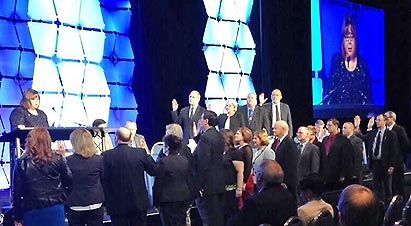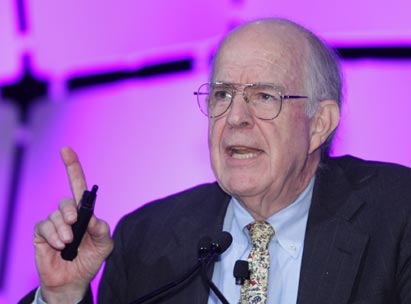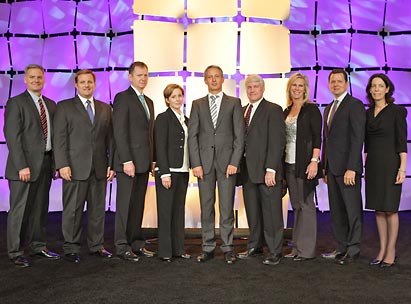AARC Congress 2013 Gazette for Sunday, November 17
AARC installs 2014 officials

The Association installed its 2014 officials during this morning’s AARC Annual Business Meeting. Frank Salvatore MBA RRT FAARC was installed as president-elect, and Bill Lamb BS RRT FAARC, Karen Schell DHSc RRT-NPS RPFT, and Cynthia White MS RRT-NPS FAARC, as directors-at-large. Incoming section chairs with BOD seats include Natalie Napolitano MPH RRT-NPS FAARC (Neonatal-Pediatrics) and Kimberly Wiles BS RRT CPFT (Home Care).
Four Specialty Sections also held elections this year, and these individuals were elected: Adult Acute Care, Keith Lamb RRT-ACCS; Diagnostics, Katrina Hynes BAS RRT CPFT; Education, Ellen Becker PhD RRT-NPS FAARC; and Management, Cheryl Hoerr MBA/HCM RRT FAARC.
New House of Delegates officers include: speaker, Debra Skees MBA RRT CPFT; speaker-elect, John Wilgis MBA RRT; secretary, Kari Woodruff BS RRT-NPS; and treasurer, Keith Siegel BS RRT CPFT. John Steinmetz MBA RRT is now the past speaker.
Dr. Stephen Jencks shares his insights on readmissions

Yesterday Keynote Speaker Stephen Jencks MD MPH shared his groundbreaking research on readmissions and encouraged respiratory therapists to step up and be a part of the team contributing to excellent patient care across the continuum. “You can leave this meeting equipped to lower readmissions for your patients,” he said.
Dr. Jencks is a consultant in health care safety and quality, a senior fellow at the Institute for Healthcare Improvement, and a former assistant surgeon general of the U.S. He is considered the nation’s top authority on preventable hospital readmissions.
“The game is changing—something is really happening,” he noted. “We are already seeing readmission rate decreases. We are also seeing reduced admission rates for all patients. There are new kinds of collaboration across the continuum.”
Dr. Jencks spoke about the role RTs can play in the new health care system. “You need to be part of the team,” he said. “Don’t give up the base of clinical expertise you have because it is needed.” The teamwork between hospitals and communities is vital. He urged RTs to use a discharge checklist and, importantly, to collaborate with those in the community who will be taking care of their patients once they are discharged. “Examine what you’re doing and what you think you’re doing,” he emphasized. “Talk with patients readmitted” and learn. You have an opportunity to do for your patients what you set out to do when you first began in the profession, he said.
Dr. Jencks closed by saying, “Preserve a hope and belief that you can achieve a bunch of things. There’s a lot of stuff on your agenda—go out and learn!” The Keynote Address was supported by a grant from Boehringer Ingelheim.
Zenith Awards go to top companies

Six respiratory care companies walked away with Zenith Awards during yesterday’s Awards Ceremony:
- Masimo Corporation
- Covidien
- Aerogen
- Draeger Medical Inc.
- Philips Respironics
- Teleflex Medical
Each of the 6 companies was selected by our members based on the quality of their products, accessibility of their sales staff, responsiveness, service record, truth in advertising, and support of the respiratory therapy profession.
House of Delegates honors top performers
The AARC House of Delegates recognized excellence among its ranks with the following awards:
- Outstanding Affiliate Contributor: Shelia Guidry CRT, Louisiana
- Delegate of the Year: Daniel D. Rowley MSc RRT-ACCS FAARC
- Summit Award: Florida Society for Respiratory Care
The winners were announced during this morning’s Annual Business Meeting.
New Jersey Congressman to meet with AARC/NJ leadership
Earlier this year Rep. Rob Andrews (D-NJ) reached out to the AARC and requested a detailed briefing on the respiratory profession and our legislative agenda. Congressman Andrews is a co-sponsor of HR 2619, The Medicare Respiratory Therapist Access Act. When the congressman learned he’d be in Southern California on government business this week, he requested an opportunity to come to Anaheim and meet with AARC and the New Jersey Society for Respiratory Care leadership. Congressman Andrews will also have a VIP tour of the exhibits. We are pleased he will visit us today.
Membership drive winners announced
Several state societies learned they’d be taking home some great prizes during the Annual Business Meeting this morning, as AARC leaders announced the winners in our friendly competition to see which states would end up with the biggest percentage change in members and which could draw in the largest number of members this year.
Nevada came out on top in the percent change category, with New Mexico coming in second and Mississippi coming in third. In the race to see which state societies would lead the way in actual number change in membership, Pennsylvania came in first, Florida came in second, and California came in third.
All 6 winners will have their choice of 1 of 3 prizes: complimentary AARC Congress 2014 registration for 15 members; complimentary AARC membership for 15 members; or a $250 catered meal at a state board meeting between Dec. 2013 and Oct. 31, 2014.
2013 AARC Executive Reports
President’s Report
George Gaebler MSEd RRT FAARC
As I finish the first year of my term as president of the AARC, I wanted to take the time to say thank you. It has been a wonderful opportunity and honor to serve you and the AARC.
The AARC remains a strong organization with membership at 52,000 members, despite the ups and downs with the economy. We continue to remain a great professional organization with great members.
AARC continues with activity in Washington DC to ensure patients have access to respiratory therapists and their disease management skills in all care sites. The plan is in place for renewed activity on the Respiratory Care Access legislation HR 2619 starting with the second session of the 113th legislative session in January 2014.
The following is a high-level summary of the accomplishments in relation to my goals over the past year.
1. Continue to promote the patient and their family’s needs by being the advocate for those patients with respiratory disorders.
- AARC has continued to support patient advocacy groups and continues to support the website YourLungHealth.org. The booklet entitled “A Patient’s Guide to Aerosol Drug Delivery” continues to be available for patients’ use. It is also being translated into more languages.
- The AARC has joined more than 85 other organizations in signing on to a letter asking HHS Secretary Kathleen Sebelius to incorporate an out-of-pocket cost estimator into the regulations so people seeking a qualified health plan (QHP) through the marketplaces can get a realistic idea of what their out-of-pocket costs will be. The out-of-pocket calculator is considered especially important for those with chronic health conditions and/or disabilities, who are likely to make greater use of the health care system and, thus, will incur higher out-of-pocket costs.
2. Continue to develop and execute strategies that will increase membership and participation in the AARC both nationally and internationally.
- Membership remains strong, but we cannot stop our efforts to grow our membership. The membership committee has been very active this year to continue our growth. Activity on the international level is growing as more areas around the world look to the USA model of respiratory therapy education.
3. Promote patient access to respiratory therapists as medically necessary in all care settings through appropriate vehicles at local, regional, and national venues.
- The AARC activity to bring access to the respiratory therapist across all sites continues with our efforts in Washington. We have keyed on physician members of Congress and the Senate to help us gain this important goal. AARC members need to stay active and vigilant in communicating and building relationships with their representatives and senators.
4. Continue to advance our international respiratory community presence through activities designed to address issues affecting educational, medical, and professional trends in the global respiratory care community as well as continue to advance advocacy for the patient.
- International activity continues to grow at a fast pace. During this past year, several new opportunities to provide education were achieved and plans continue to assist those with requests.
5. Evaluate transitional needs to meet the competencies necessary to develop the “Respiratory Therapist for 2015 and Beyond” based on the expected needs of respiratory care patients, the profession, and the evolving health care system.
- The past 3 years have been filled with activity regarding “Respiratory Therapist for 2015 and Beyond.” Data has been gathered from a number of organizations; information has been shared at a great number of meetings around the country. In November 2012 we set the direction for further study and a committee of experts in each area for successful implementation of this important process going forward. A committee was appointed with charges specific to the findings and AARC Board actions in November 2012.
6. Promote the access of high-quality continuing education to develop and enhance the skill base of current respiratory therapists to meet the future needs of our profession.
- AARC continues to be the leader in education for the respiratory therapist through publications, conferences, and webinars.
7. Maintain and expand relevant communication and alliances with key allies and organizations within our communities of interest.
- AARC continues to develop relationships with other organizations and advocacy groups with goals similar to those of the AARC.
8. Expand efforts to obtain research funding.
- AARC continues to work on efforts to obtain and increase research funding.
- This has proven successful with many more revenue and grants during this year.
9. Increase and enhance activities to increase public awareness of respiratory therapists and their role in the treatment of respiratory disorders.
- AARC remains involved with activity to increase the awareness of respiratory therapists. One great example is the work that has been done in DRIVE4COPD. Hundreds of therapists throughout the USA participated in screening for COPD.
In conclusion, I would like to thank the AARC membership, the House of Delegates, the executive office, and the state societies for making this one of the more delightful times in my life. I have had great fun being able to serve you and a profession that is near and dear to my heart. I look forward to continuing to serve the AARC and to working with your next president, Frank Salvatore, who will be sworn in December 2014 in Las Vegas, NV.
Secretary-Treasurer’s Report
Frank Salvatore, MBA, RRT, FAARC
At the time of writing this report we were 16 days into a government shutdown, which officially ended on Oct. 17, 2013. Rest assured your professional organization is in much better hands and in good fiscal shape. The economy has seen an uptick for most of the year, and the AARC continues to be served by a fiscally responsible Executive Office and Board of Directors. Some of the 2013 highlights are:
- Membership—Our number of members continues to show little change year-to-year. Nonetheless, with your dues and all other revenues we continue to provide the programs and services that are important to you. This includes providing high-quality educational programs and working with all levels of government to assure that you are appropriately recognized for what you do.
- Revenues—Our revenues are changing with the times but remain strong overall thanks to your continued support via membership dues, educational course offerings, and attendance at meetings such as the International Respiratory Convention & Exhibition.
- Grants—Because the health care industry recognizes the AARC as the leader in pulmonary health, we have received several sizable grants to underwrite spirometry testing, training, and other activity.
- Expenses—Our actual expenses for 2013 are projected to come in below budget for the year at this time. The AARC Officers and Executive Office Staff take very seriously the trust you have placed in us and will always strive to spend your money wisely.
Thanks to each and every one of you for making this another successful year for the AARC. And thank you for the opportunity to serve as your secretary-treasurer for the past year.
Thomas L Petty’s Lessons for the Respiratory Care Clinician of Today
A strong case can be made that Dr. Tom Petty, who passed away 4 years ago, was the single most important physician in the history of respiratory care. This first annual Petty Memorial Lecture (delivered Saturday by David J Pierson MD FAARC) addressed 4 topics: Who was Tom Petty? What were his most important contributions to respiratory care? What was it that was so special about him? And, what lessons to his life and work offer for the profession’s members, today and for decades to come?
Born in 1932, Dr. Petty was on the faculty of the University of Colorado School of Medicine for 45 years, having become head of its pulmonary division at age 38. By that time he was already internationally known—for describing and naming ARDS, and first using PEEP to treat it; for establishing one of the first pulmonary rehab programs anywhere; for demonstrating the life-saving benefits of long-term oxygen therapy; and for creating the first true multidisciplinary approach to respiratory care.
Dr. Petty produced over 400 PubMed-cited articles, plus 45 books and hundreds of other publications. His contributions to education include training dozens of the nation’s most prominent PCCM physicians, and establishing numerous conferences and educational institutions such as the Snowdrift Pulmonary Conference and the National Lung Health Education Program. He also produced many conferences, publications, and other resources for patients and their families—including YourLungHealth.org and AskDrTom on the AARC’s website, and his own website, www.drtompetty.org, which continues to provide a host of valuable, practical resources.
Dr. Petty is not here to offer his own lessons for today’s respiratory care clinician, but Dr. Pierson listed 6 points at the heart of Dr. Petty’s teachings that he was confident would be endorsed:
- Whatever your role, you need to be an expert in the most important, core areas of respiratory care—such as mechanical ventilation, ARDS, and COPD;
- Respiratory care is a team sport, every member is important, and each needs to communicate well and work together;
- Education needs to be targeted at those in the best position to benefit the patient—including primary care providers and family members;
- Everyone in the field needs to understand the important role of the respiratory care industry and deal with it responsibly;
- Never forget that it’s all about the patient; and
- Respiratory care should be exciting and fun.
